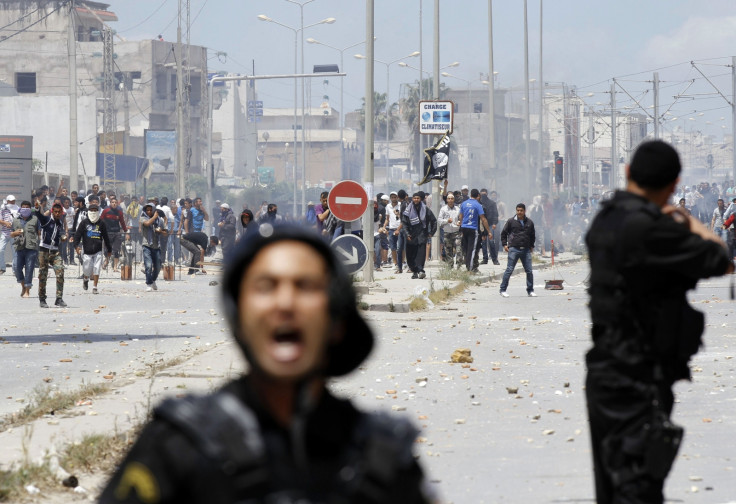Tunisia: Weapon smuggling a 'worrying development' for country that is facing rise of hard line islamist groups

Political and security analysts warn against the menace posed by weapons smuggling through official border-crossing points between the two countries.
Imad Mesdoua, a political analyst specialising in the Maghreb (North Africa), believes the arms caches found next to the country's increasingly porous border with Libya are destined for militant groups in Tunisia.
Earlier in March, Tunisian security forces, which now fear a cross-border spill, uncovered a series of arms caches near the south-east border with Libya, close to the city of Ben Guerdane.
The latest arsenal included 20 rocket-propelled grenade launchers and various types of rockets, 40 anti-tank mines, detonators, grenades and 23,000 rounds of assault rifle ammunition.
Libya remains the largest haven for terrorist groups affiliated with Islamic State (Isis) and is the main reservoir for all kinds of groups fighting in Syria.
As IS expands its presence in Libya, Tunisia is waging a campaign against hard-line Islamist groups that emerged after a 2011 uprising against autocrat Zine El-Abidine Ben Ali.
For Mesdoua, the arms discovered are coming from Libya, and there is little doubt they are destined to arm jihadis in Tunisia. "My guess is that it is probably for the Tunisians," he told IBTimes UK, explaining that the country is facing two type of threats.
Jihadis and Tunisian returnees make up domestic menace
The domestic menace comes from jihadis who are already on the territory - such as radical Salafist group Ansar al-Sharia and its member group Uqba Bin Nafe, which operates in the Chaambi Mountains near the Algerian border, the main hotbed of militant activity - and Tunisian returnees coming back from Syria and Iraq "by far the biggest contingent".
Indeed, Tunisia has been a major source of Islamist fighters travelling to Syria since 2011; of the estimated 5,000 currently operating in the region, a few hundreds have returned home.
"The number of fighters in a country that small, with security services that are not as robust as other regional powers, is worrying," Mesdoua said.
After arresting over 100 suspected members of a terrorist group specialising in weapon smuggling, some of whom were said to be preparing attacks, the Tunisian government published video footage showing evidence of an IS influence on some of those detained.
In the video published by the Interior Ministry on Facebook, the militant cell said it had instructions for making explosives and a picture of Abu Bakr al-Baghdadi, the leader of IS.
Tunisia is also facing an external threat in the form of an arms proliferation in Libya and a spillover, with a large number of Libyans crossing the border and "the possibility of infiltration".

Tunisia's lacks financial capability to fight extremism
While the arms caches have existed for a while – the first ones were discovered in 2013 – the analyst described the findings as a "worrying development" because, he says, Tunisian security and intelligence apparatus are potentially lacking the experience to deal with this new threat.
In his view, Tunisia has to step up its efforts because "the nature of the threat has grown substantially and traditional methods or weapons are not going to be suitable to match the threat".
He said: "The Moroccans and Algerians – particularly because of their history - are more attuned to these threats, know how to respond to them, and are more aware of some of the networks, whereas the Tunisians are playing a game of catch-up now in terms of experience and learning."
Now outspending every nation on the continent in terms of arms buying, Algeria's purchases reflect a perceived threat coming from Libya, Mesdoua said.
In terms of security, while Algeria has the financial capability to acquire such an arsenal through its huge foreign exchange reserves, little sister Tunisia does not.
"Tunisia is going through serious economic problems, it doesn't have the money and it is taking a lot of time to stabilise its economy," Mesdoua explained.
Tunisia requires that counter-terrorism expertise, which he says it is starting to build up, but it also needs to build up its understanding of the phenomenon – just as Algerians did in the 1990s "learn as you go".
Mesdoua said: "The most important thing here is intelligence and coordination between the intelligence agencies – and because the Libyans have basically no state, it's tougher to share intelligence with them or to get a grip on what is going on in their territory because it's an absolute menace."
In February, Tunisia announced it would take delivery of eight Black Hawk attack helicopters - used to carry troops and launch attacks - from the United States in the second half of the year, to help it in the fight against Al-Qaeda-linked extremists.
Isis or al-Qaeda? Who supports who in Tunisia
- A number of Tunisian Salafist Jihadist groups want to establish an Islamic emirate in Tunisia
- They have pledged allegiance to either the Jabhat an-Nuṣrah li-Ahli ash-Shām (Islamic Movement of the Free Men of the Levant, or al-Qaeda in Syria) or ad-Dawlat al-Islāmiyah fī al-ʿIrāq wa sh-Shām (known as the Islamic State of Iraq and al-Sham, or IS)
- Tunisia's jihadist group Ansar al-Sharia (Partisans of Islamic law), one of the most radical Salafi movements, has not yet officially picked a side between IS and al-Qaeda after the split between the two super groups
- The group used to define itself as an al-Qaeda affiliation in Tunisia until 2013, but then declared allegiance to the IS Caliph, Abu Bakr al-Baghdadi
- While some of Ansar al-Sharia's youth have been lured by the IS PR-apparatus, according to security researcher Habib M Sayah, the group's leader Abu Ayadh al-Tunisi (also known as Saifallah Ben Hassine) has a close relationship with influential jihadi clerics who support al-Qaeda and reject IS
- Meanwhile, the Uqba bin Nafe Battalion is Ansar al-Sharia's three-year-old armed wing
- Uqba bin Nafe declared allegiance to IS in September 2014
- Tunisia's Interior Minister Lotfi Ben Jeddou said in June 2014 that of the nearly 2,400 Tunisian jihadists fighting alongside Syrian rebels (this figure has since been revised upwards), 80% of them were members of IS
© Copyright IBTimes 2025. All rights reserved.






















